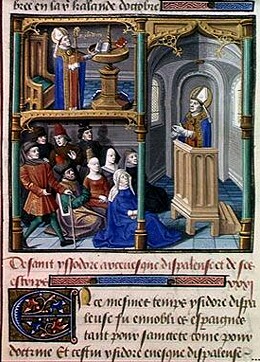 |
The Saint of the Day
St Isidore of Seville – April 4
Prof. Plinio Corrêa de Oliveira
Biographical selection:
Bishop and Doctor of the Church, illustrious for his doctrine and sanctity, St. Isidore of Seville (c. 560-636) illuminated Spain with his zeal, Catholic Faith, and observance of ecclesiastical discipline. Born in Cartegena, Spain, he was considered the most learned man of his times. He was a prolific writer, and fought tenaciously against the Arians.

St. Isidore of Seville by Murillo |
His name shines in a family of saints: His elder brother St. Leander was his immediate predecessor in the See of Seville; while a younger brother St. Fulgentius presided over the Bishopric of Astigi. His sister Florentina was a nun, and ruled over forty convents and one thousand religious.
In his Chosen Works, there is a text titled “Lamentations of a Sinner.” In it, St. Isidore advises:
“In all your acts, in all your works, in all your behavior, imitate the good; be a competitor of the saints, keep your eye on the heroism of the martyrs, follow the example of the just. It is my wish that the life and teachings of the saints be for you an encouragement to virtue.
“Have a good spirit, maintain your good reputation and do not diminish it with any bad action; do not let it fall into dishonor.
“Demonstrate what you think by your bearing and your walk. Have simplicity in the way you present yourself, purity in your walk, gravity in your gestures, honesty in your step. Do not display lasciviousness, arrogance, and superficiality. The stance of the body is the indicator of the mind. Your walk, therefore, should not represent superficiality; your step should not affront yourself or your neighbor.
“Do not permit yourself to be a spectacle for the gossip of others; do not allow your honor to be degraded. Do not associate with vain people. Avoid the bad; rebuff the indolent. Flee overmuch association with men, especially those who are more inclined to vice.
“Seek the good, desire their company. Look for the company of the saints. If you will share their way of acting, you will share their virtue. If you walk with wise men, you will be wise; if you walk with idiots, you will be an idiot, for persons seek those of similar stripe.
“It is dangerous to live among bad persons; it is harmful to be surrounded by those with perverse wills. You will feed yourself on their infamy if you associate with the undignified. It is better to suffer the hatred of evil persons than their company. Analogously, just as much good comes from the lives of the saints, much evil comes from the lives of bad persons, for those who touch what is filthy become contaminated.”
Comments of Prof. Plinio:
To comment on this beautiful excerpt of St. Isidore, let me highlight two points.
First, he establishes a profound link between the moral conduct of a man and his exterior behavior, that is, how the man presents himself and the way he appears before others. The basic idea is that everyone should appear before others in accordance with a Catholic moral ideal. In other words, no one should be entirely spontaneous and follow his first uncontrolled instincts. That is revolutionary. By his external way of being, his bearing, his gaze, his walking, his behavior, every man should symbolize the moral ideal he follows.

Scenes from the life of St. Isidore |
The presupposition of St. Isidore is that, since we have original sin, it is not true that our virtue will always appear when we deal with others. Many times virtue is not apparent, but rather our bad side shows. So, we should be careful to express what is good and repress what is bad. We have the obligation to suppress our bad side in our external behavior. This is not hypocrisy or vanity. It is an obligation of respect to others and principally to God. It is an implicit affirmation that the vice that lives in us has no right to appear in the light of day.
Hence, we have to discipline ourselves and follow an exterior way of conduct that will reflect the best of what we are interiorly. If man were free of original sin, this would not be necessary. But since original sin exists, we must discipline ourselves and control our bad impulses.
This is why in any civilization that achieves a certain degree of perfection, parents teach their children to have good posture and fine manners in order to reflect their ideal.
Second, when St. Isidore speaks of how one should seek out the good and avoid bad company, he implicitly refutes the progressivist mentality that affirms that the good should mix with the bad in order to “do apostolate.” This is an error. If we start to associate with those who are bad, we will become bad also.
These words of St. Isidore frontally oppose the progressivist method of “apostolate of conquest,” which preaches that Catholics should “bring Christ to the world.” This was the mentality of the student and worker social movements that have inundated the Church since the 1930s. Their partisans preach that Catholics should seek out worldly men and women in their own circles – in factories, football stadiums, or nightclubs. The practical result of such experiences was that the worker-priests who went to the factories became communists; those who went to nightclubs became morally relaxed and increasingly compromised in their Catholic principles. Large sectors of the Church became infected with this permissive mentality.

Vatican II's aggiornamento: Card. Lehmann in a fool attire, posing with badly dressed women - for more, click here |
An analogous thing is happening with Vatican II’s aggiornamento, that is, the adaptation of the Catholic Church to the modern world. Instead of changing the world and converting it to Catholicism, what is happening is precisely the opposite: The world is conquering the Church. Everywhere we see priests and Bishops abandoning their respectable habits and cassocks and wearing worldly clothes; we see churches built in the modern art styles and imitating theaters, the Mass becoming a show for the public, popular music invading the sanctuaries, and revolutionary customs and clothes being admitted everywhere to accomodate the youth.
St. Isidore of Seville thinks otherwise. He advises us to contain our bad spontaneity, to always be dignified. His words of advice also explain the failure of the aggiornamento: “Analogously, just as much good comes from the lives of the saints, much evil comes from the lives of bad persons, for those who touch what is filthy become contaminated.”
Let us ask the great St. Isidore of Seville to give us both the self-discipline to present only the dignified aspects of our souls in our external behavior and the discernment to know what is good and bad. Then we should foster in ourselves an admiration for the good and the desire to follow it, and a rejection for the evil and the resolve to resist it.


  | | Prof. Plinio Corrêa de Oliveira | |
The Saint of the Day features highlights from the lives of saints based on comments made by the late Prof. Plinio Corrêa de Oliveira. Following the example of St. John Bosco who used to make similar talks for the boys of his College, each evening it was Prof. Plinio’s custom to make a short commentary on the lives of the next day’s saint in a meeting for youth in order to encourage them in the practice of virtue and love for the Catholic Church. TIA thought that its readers could profit from these valuable commentaries.
The texts of both the biographical data and the comments come from personal notes taken by Atila S. Guimarães from 1964 to 1995. Given the fact that the source is a personal notebook, it is possible that at times the biographic notes transcribed here will not rigorously follow the original text read by Prof. Plinio. The commentaries have also been adapted and translated for TIA’s site.
|
Saint of the Day | Home | Books | CDs | Search | Contact Us | Donate

© 2002- Tradition in Action, Inc. All Rights Reserved
|
 |

|